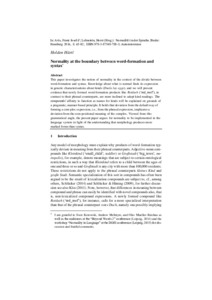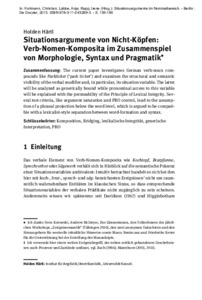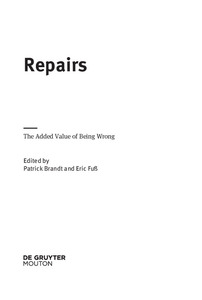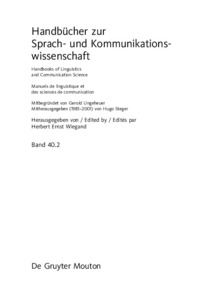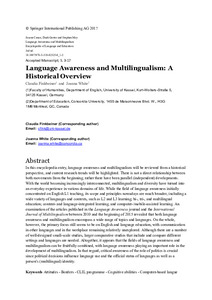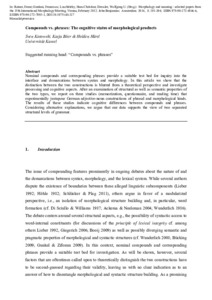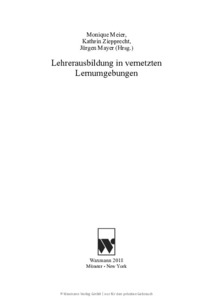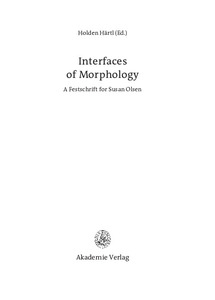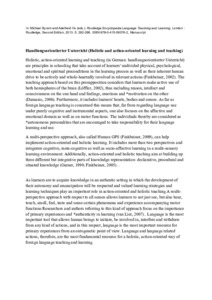Suche
Anzeige der Dokumente 1-10 von 11
Teil eines Buches
 Normality at the boundary between word-formation and syntax
Normality at the boundary between word-formation and syntax
(Buske, 2016)
This paper investigates the notion of normality in the context of the divide between word-formation and syntax. Knowledge about what is normal finds its expression in generic characterizations about kinds (Ducks lay eggs), and we will present evidence that newly formed word-formation products like 'Rotdach' (‘red_roof’), in contrast to their phrasal counterparts, are more inclined to adopt kind readings. The compounds’ affinity to function as names for kinds will be explained on grounds of a pragmatic, manner-based ...
Teil eines Buches
 Situationsargumente von Nicht-Köpfen: Verb-Nomen-Komposita im Zusammenspiel von Morphologie, Syntax und Pragmatik
Situationsargumente von Nicht-Köpfen: Verb-Nomen-Komposita im Zusammenspiel von Morphologie, Syntax und Pragmatik
(De Gruyter, 2015)
The current paper investigates German verb-noun compounds like Parkticket (‘park ticket’) and examines the structural and semantic visibility of the verbal modifier and, in particular, its situation variable. The latter will be analyzed as generically bound while pronominal access to this variable will be explained with the permeability of the Principle of Lexical Integrity. Several test criteria, like argument saturation and PRO control, lead to the assumption of a phrasal projection below the word level, which is ...
Teil eines Buches
 Generic rescue: argument alternations the monotonicity condition
Generic rescue: argument alternations the monotonicity condition
(De Gruyter Mouton, 2013)
Generic interpretations as in “The tiger kills to survive” have often been observed to reconstitute the linguistic acceptability of certain verb argument structure modifications. But can the right context rescue everything? This paper investigates the impact a generic interpretation can have on three types of argument alternations: (i) the intransitive use of inherently telic verbs like “to kill”, (ii) the intransitive use of stative verbs like “to love”, and (iii) middle alternations like “it reads easily”. It will ...
Teil eines Buches
 Argument-structural restrictions on word-formation patterns
Argument-structural restrictions on word-formation patterns
(De Gruyter Mouton, 2015)
The implementation of argument-structural effects on word-formation is a vital aspect in modeling the lexical system and the interface between morphology and syntax. The current article provides an overview of theoretical perspectives in the field and presents analyses of structural principles holding in the domain. A number of test cases relating to fundamental operations, e.g., in compounding and nominalization are discussed, as well as specific conditions restricting the formation of morphologically complex words.
Teil eines Buches
 Semantic non-transparency in the mental lexicon
Semantic non-transparency in the mental lexicon
(De Gruyter, 2015)
The notion of “Eigentlichkeit” (‘authenticity’), when approached from a perspective of language philosophy, is associated with the quality of linguistic entities of referring to things in the world in a truthful and a maximally transparent way, cf. Gardt (1995). Obviously, there are numerous expressions that do not seem to conduct themselves accordingly and display a rather “non-authentic”, i.e., non-transparent behavior instead, like indirect and ironic speech acts or idiomatic expressions like Cat got your tongue? ...
Teil eines Buches
 Language Awareness and Multilingualism: A Historical Overview
Language Awareness and Multilingualism: A Historical Overview
(Springer, 2017-05-20)
In this encyclopedia entry, language awareness and multilingualism will be reviewed from a historical perspective, and current research trends will be highlighted. There is not a direct relationship between both movements from the beginning; rather there have been parallel (independent) developments. With the world becoming increasingly interconnected, multilingualism and diversity have turned into an everyday experience in various domains of life. While the field of language awareness initially concentrated on English ...
Teil eines Buches
 Compounds vs. phrases: The cognitive status of morphological products
Compounds vs. phrases: The cognitive status of morphological products
(John Benjamins, 2014)
Nominal compounds and corresponding phrases provide a suitable test bed for inquiry into the interface and demarcations between syntax and morphology. In this article we show that the distinction between the two constructions is blurred from a theoretical perspective and investigate processing and cognitive aspects. After an examination of structural as well as semantic properties of the two types, we report on three studies (memorization, questionnaire, and reading time) that experimentally juxtapose German ...
Teil eines Buches
 Mehrsprachigkeitspotentiale im bilingualen Sachfachunterricht
Mehrsprachigkeitspotentiale im bilingualen Sachfachunterricht
(Waxmann, 2018)
Im transdisziplinär angelegten PRONET Teilprojekt „Mehrsprachigkeitspotentiale im bilingualen Sachfachunterricht“ wurde eine Lernumgebung zum bilingualen Lehren und Lernen in den Zielsprachen Englisch, Französisch und Spanisch für das Sachfach Geschichte entwickelt und evaluiert. Diese qualifiziert zukünftige Unterrichtende für das bilinguale Lehren und Lernen in der heutigen mehrsprachigen Gesellschaft. Ziel war es, bei zukünftigen Unterrichtenden eine Bewusstheit für die Rolle von Mehrsprachigkeit, Mehrperspektivität ...
Teil eines Buches
 Arguments of non-heads
Arguments of non-heads
(Akademie Verlag, 2013)
The current paper investigates these cases from a lexicalist perspective. In particular, I will discuss whether realizations of arguments of non-heads of the above types are based on a regular grammatical process or not. I will argue that this is the case indeed with constructions of the type Designanalyse des Geschirrs, where the post-nominal element figures as argument of both the head as well as the non-head. In contrast, (prepositional) external argument realizations of the type in (1)—i.e. constructions in which ...
Teil eines Buches

 Handlungsorientierter Unterricht (Holistic and action-oriented learning and teaching)
Handlungsorientierter Unterricht (Holistic and action-oriented learning and teaching)
(Routledge, 2013)
Holistic, action-oriented learning and teaching (in German: handlungsorientierter Unterricht) are principles in schooling that take account of learners' undivided physical, psychological, emotional and spiritual preconditions in the learning process as well as their inherent human drive to be actively and whole-heartedly involved in relevant actions (Finkbeiner, 2002). The teaching approach based on this presupposition considers that learners make active use of both hemispheres of the brain (Löffler, 2002), thus ...

